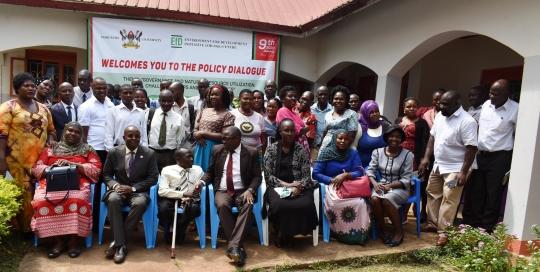Environmentalist and economists from Environment for Development Initiative (EfD- Mak Centre) set out from the ivory tower to Wakiso district headquarters to dialogue with the councilors on the governance and management of natural resources in the district.
The dialogue held on 9th January, 2020 under the theme, “Governance and Natural Resource Utilization; Challenges, Gaps and Opportunities” attracted district executives, (Chairperson for committees, town council chairpersons and clerks, sub county chairpersons and sub county chiefs, Municipality mayors, town clerks, physical planners, engineers, environmental and tourism officers and councilors from the district committee of Natural Resources.
The policy tour was a follow up activity of the initial dialogue held in November 2019 with government ministry officials, agencies, private sector and civil society that discussed some of the research findings the university had come up with that were important to government when implementing policies.
“We had that policy dialogue at Makerere University and thought that we must touch-base with local leaders in Uganda because they are charged with an oversight role over different natural resources.
Our objective is for us to come up with workable solutions that can accelerate the rate of growth of the economy without compromising the status of the environment.
For us in Makerere we are saying that let us work with environmentally friendly policies because this environment can be saturated.”, Centre Director Prof. Bbaale explained.
The Director observed that despite the fact that Uganda has adequate laws, agencies, parliamentary committees on environment and natural resources, there are gaps in bringing empirical flavor into government policy formulation and implementation.
Dr. Bbaale said, the university has a team of highly qualified experts undertaking research in different sectors for instance the interaction between energy and environment, agriculture and environment, economic activities and forestry and economics and wetland interaction among others.
“We are undertaking research in different areas of environment and natural resources and coming up with real solutions for example the reason for cutting of trees is to obtain energy for cooking. We are saying there are alternative energy sources and technologies we can come up with to mitigate tree cutting.
As a center, we have solutions. The road is needed for the economy to grow but how do you do this by respecting this resource? How can we do the fishing while respecting that resource that is a habitat to our fisheries? that is why we are in Wakiso”, The Director stated.
While officially opening the dialogue, the Vice Chairperson Wakiso district, Hon. Betty Naluyima decried the level of depletion of natural resources in the district.
“Wakiso environment has been depleted by the people of Wakiso and outsiders. The rate at which Lake Victoria is deteriorating is worrying. Uganda is blessed by nature but this has been taken for granted”. She said.
Hon. Naluyima observed that Uganda is refered to as the Pearl of Africa because of her good environment and not industries and development projects adding that the country cannot survive without mother nature. Naluyima called for collective responsibility among all stakeholders to put into practice the good legislation.
“More than 50% of our population depend on agriculture and the environment. We need to work together to restore the environment. We should go back to the original stand in the Bible to tender the garden, if not, we shall continue suffering”, Hon Naluyima warned.
The District Natural Resources Officer Rebecca Ssabaganzi said the university was in the district to tease with them to have a policy dialogue on how the district can sustainably use the environment while upholding the development paradigm shift being faced in Uganda.
Ssabaganzi said Wakiso is one of the biggest districts with the highest population and a number of development activities taking place.
She said although the district is endowed with natural resources including lake and water resources, wetlands, forests, land, sand, clay, stones, minerals, wildlife, air, soil, the sun, human beings etc, the environment and the resources were at stake due to the high population and unsustainable use with land and water resources being big constraints needed for construction and development.
“Environmental degradation in Wakiso district is alarming for example the quarry site has not been restored, wetlands have been filled for construction.The oil spills on the lake resulting from the methods of sand mining and trucks has affected fish breeding and will cost us and generations to come. Fish stocks are lower and the population is not accessing the lake site,” the Natural Resources officer stated.
Ssabaganzi said, that the Ugandan population ought to understand that the natural resources base is kept for the good of Ugandans warning that unless there is a change of, “the I do not care attitude” the country will continue facing the impacts equally.
The constitution (eg Local Government Act, Cap 243; The National Environment Act, 2019; Forest and tree planting Act, 2003; Physical Planning Act, 2010 and the Wild life Act 1996 and many others mandates government to keep natural resources for the people of Uganda.
The National Environmental Act (NEA) of June 2019 provides under section 26 Environmental management by urban and district councils. Subject to this Act and any other applicable law, urban and district councils are responsible for the management of the environment and natural resources under their jurisdiction.
Wakiso is a local government, with four municipalities, nine town councils and six sub counties yet a rural district by categorization. It is centrally located implying spillover effects/impacts and a conduit to the center.
The population census of 2014 revealed 7% of the Ugandan population was living in Wakiso District whose population is currently at 2,007,700.
The district has a growth rate of 4.9% and the mean house hold size of 4.6 persons per house hold. The Greater Kampala Metropolitan area depicts and presents special urban challenges of this locality especially those related to infrastructure thriving on natural resources.
Details please click: http://caes.mak.ac.ug/uncategorized/efd-mak-centre-conducts-a-policy-to…
